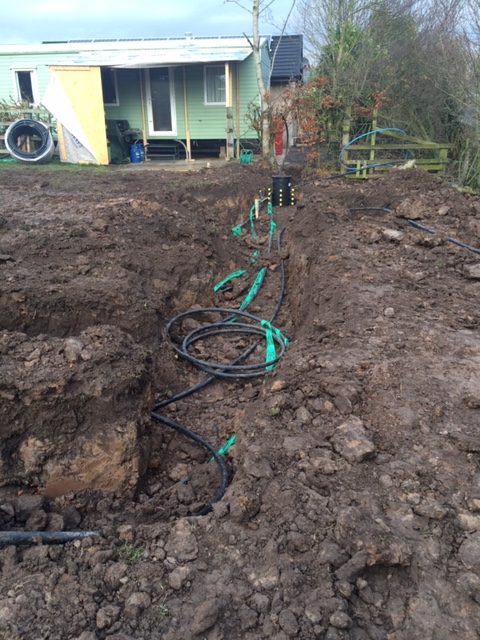Ground Source Heat Pumps
Ground source heat pumps are a great way to create hot water for the home or office. Heat from the ground is absorbed at low temperature into a fluid. This fluid then passes through a compressor where its temperature is increased and transfers its higher temperature heat to the heating and hot water circuits of the house.
Electricity is traditionally considered the more expensive way to heat the home. Typically, one kWh of electricity costs 15p, while one kWh of gas costs only 4p.
Ground source heat pumps unlike a traditional electric radiator that turn 1kWh into one unit of useful heat, a heat pump converts 1kWh into 3.5 or more units of useful heat. Therefore, electrically run heat pumps are an efficient way to heat the home. However, they don’t heat the hot water to the same temperature produced by a gas boiler and so you need to ensure that your home is sufficiently insulated in order for the heat pump to be able to heat it to the same levels of comfort.
GOS Heating are experts in the installation of both Ground Source Heat pumps.
Potential Costs for the Project
A Ground source heat pump on the other hand is £23,000, with much of the additional cost going on bore hole that needs to be drilled. The bore holes could cost as much as £9,000 for a couple of (albeit very deep) holes in your back garden. If you have the space, you can lay the ground source heat pump piping not vertically down, but horizontally within a large area, which is cheaper but this obviously requires a lot of space.
Land requirements for a ground source heat pump
A ground source heat pump requires buried pipes in the garden, so the first consideration is whether your garden is big enough (assuming you have one) to take either deep bore holes or pipes laid horizontally about a 1m or so below the surface. Clearly if you can lay the pipes horizontally this takes up a larger surface area of land but it is cheaper than drilling bore holes.
How does a Ground Source Heat Pump compare with an Air Source?
If you think when you need heat during a year, it is in the winter when you have the heating on full. The way a heat pump works it takes heat from either the air or the ground, which warms a ‘working fluid’, which in turn gets compressed maximising the potential temperature.
Now, the higher the temperature of the air / ground, the easier the heat pump needs to work to get up it up to the required temperature. So in the summer, an air source heat pump will take in warm air and it will have to do very little to heat the water to the required temperature.
Conversely, consider the winter months, when there is a far higher demand for hot water the air temperature is far lower, so the air source heat pump will need to work far harder to reach the required temperature.
With a ground source heat pumps the pipes are running buried in the ground, where you don’t get the same temperature fluctuations as you do above ground – the ground is fixed at about 10C. This means that during the winter, when the air temperature is cooler and the ASHP will need to be working really hard, a comparative ground source heat pump can provide the same hot water requirements for fewer units of electricity.
In summary, heat pumps are a very worthwhile financial investment if you don’t have access to mains gas and where the alternatives might be oil or propane.
More information
Are you thinking about getting a heat pump? GOS Heating Ltd have a team of skilled and expert engineers who can install, maintain and service you heat pump. For more information, please contact our customer services team on 01772 734 966 or email info@gosheating.co.uk























